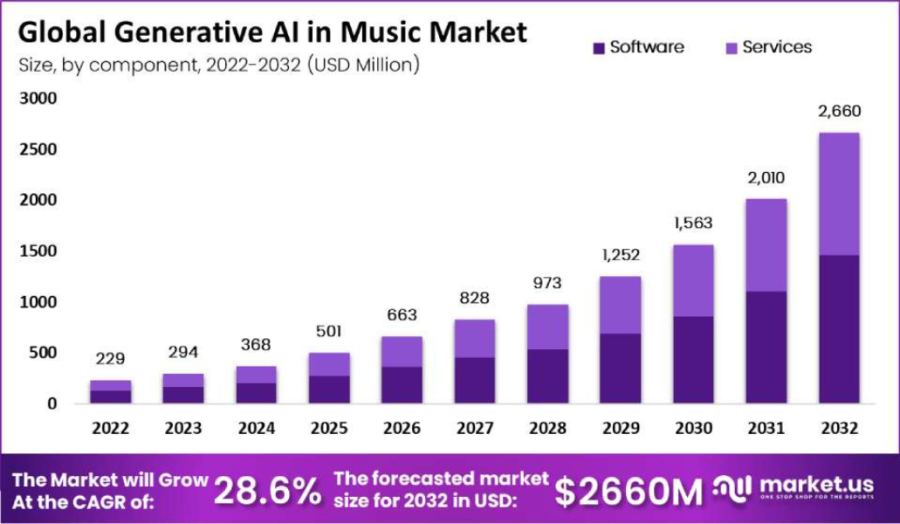Artificial intelligence raises concerns in the music industry
Market.us website
The forecasted market size of AI in the music market is projected to reach $2.6 billion in 2032. Here is the projected market size year-to-year by a Market.us report.
Artificial Intelligence has made its way into the music industry as a creative tool.
A global compound annual growth rate of 28.6%, reaching about $2.6 billion is forecasted for the music market in 2032 with generative AI technology in use, according to a report by Market.us.
Dean of Arts, Media and Entertainment Brian Rickel said he is not a fan of AI-generated art due to its theft from artists.
“Those apps collect information from existing art and artists and use other people’s work to create ‘new’ work,” Rickel said. “To me, this is plagiarism at its worst because it’s being done to collect data, facial recognition and other nefarious elements in the electronic world.”
Assistant Professor of Instrumental Music Maxwell Kiesner said he’s seen AI all over in more than just the music industry and has mixed feelings about it.
“On one hand, it could be a very interesting tool in a live or recorded setting,” Kiesner said. “But on the other hand, it leaves something to be desired about the experience.”
Kiesner said there’s a better purpose for AI being useful in things such as organizing audio workstations and creating a more efficient workflow.
Kiesner said AI gives artists the access to use any instrument for their work at their fingertips, but lacks the enjoyment of struggling to learn an instrument.
“I suppose you would teach it like any other instrument,” Kiesner said. “We acknowledge the process is what makes the product important.”
Rickel said he has heard samples of AI-generated music and finds them to be simplistic and not well-written.
Rickel said quickly producing AI music would mean that society is okay with “dumbing down the actual work of real artists because we love things quick now and without large price tags.”
Referencing the movie “Idiocracy” directed by Mike Judge, Rickel said that society will eventually become contempt with mediocrity on television, visual arts and theater.
Rickel said he does not believe AI will fully replace artistry as long as humans exist. He is also uninterested in the content created by AI, but finds the tool fun to play with.
Rickel said it will be tough to judge the content of AI-generated entertainment.
“All things are possible, but not all things should happen,” Rickel said.
Kiesner felt a similar way about AI being implemented into schools and used by musicians in the creative process.
“It’s hard to get with it. It could be helpful to a musician,” Kiesner said. “I don’t know if it has value in the creative process. Just because we have it doesn’t mean we should use it.”
Kiesner referenced the 1980’s hip-hop era of sampling which was a controversial issue at the time of its introduction.
Kiesner said the same issues hip-hop faced in the past are going to be faced more explicitly with AI. He said hip-hop sampling became successful and is now paying homage.
Kiesner said he does not foresee the music department taking on AI as part of the curriculum and thinks most artists will be steering clear of its use.

